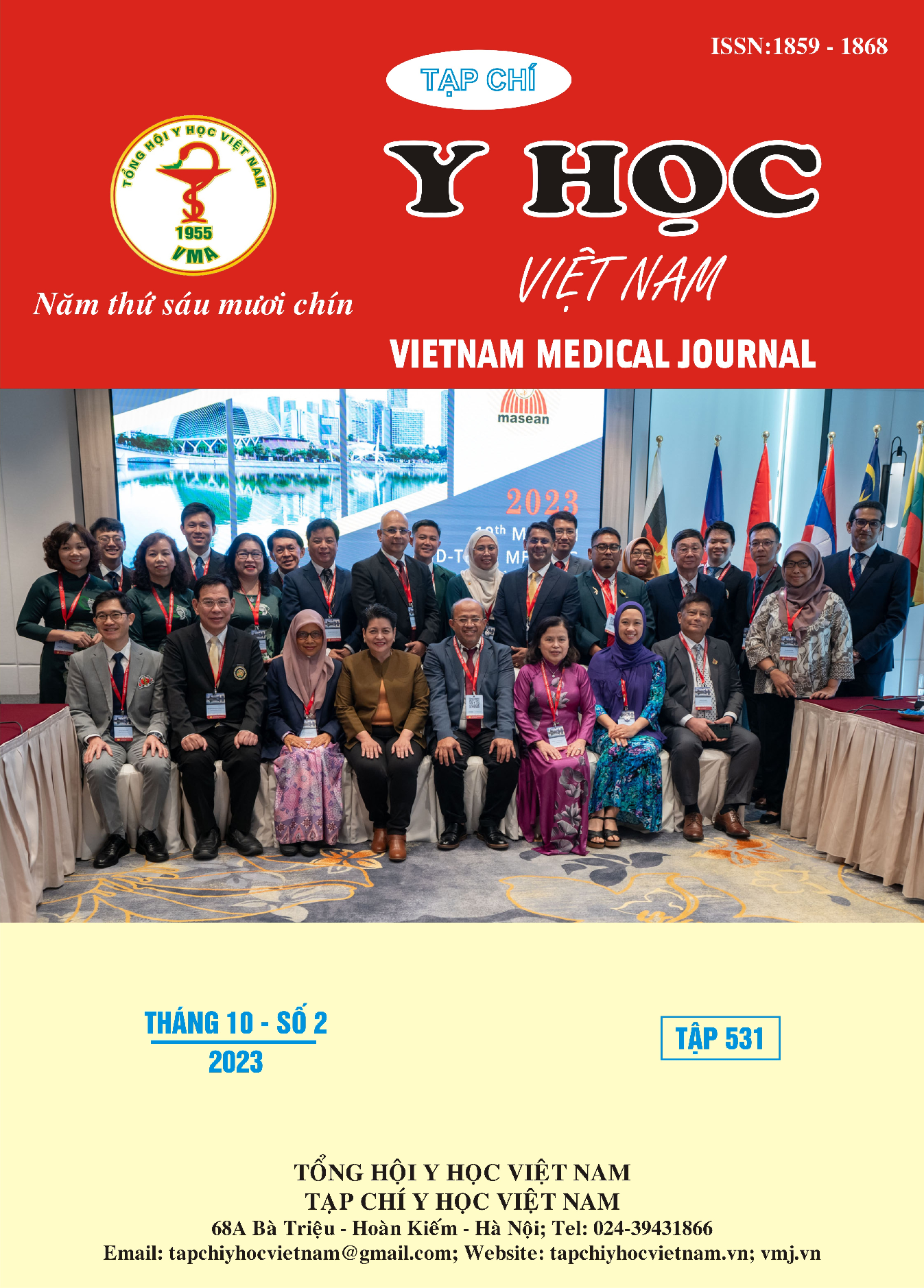RELATIONSHIP BETWEEN ACUTE CORONARY SYNDROME AND HEART SCORE IN ELDERLY PATIENT WITH CHEST PAIN
Main Article Content
Abstract
Objectives: Comment on the relationship between acute coronary syndrome (ACS) and HEART score in elderly patients with chest pain. Subjects and research methods: Prospective, cross-sectional descriptive study; conducted in 133 patients hospitalized for chest pain at the National Geriatric hospital from August 2021 to July 2022. Results: History, risk factors, troponin are different with statistical significance between 2 groups of patients with ACS and chest pain by other causes. The components of electrocardiogram, age between 2 groups of patients are not different. The higher HEART score, the higher rate of acute coronary syndrome: the group ≥ 7 points has 95.1% of ACS; group 4-6 points is 30.1%; group 0-3 points is 0%. The average HEART point in ACS group is 6.87 ± 1.12 and in no ACS group is 4.28 ± 1.22; the statistical difference with p < 0.01. Conclusion: The HEART score can predict acute coronary syndrome at high level: in this study, the ROC of HEART score is 0.938; The cutting point is 5.5 to diagnose of acute coronary syndrome in research group with a sensitivity of 88.5%, the specificity of 84.7%.
Article Details
Keywords
HEART score, acute coronary syndrome, elderly chest pain.
References
2. Six AJ, Backus BE, Kelder JC. (2008) Chest pain in the emergency room: value of the HEART score. Netherlands Heart Journal;16(6):191-196. doi:10.1007/BF03086144
3. Pope JH, Aufderheide TP, Ruthazer R, Woolard RH, Feldman JA, Beshansky JR, Griffith JL, Selker HP (2000). Missed diagnoses of acute cardiac ischemia in the emergency department. New England Journal of Medicine. 2000 Apr 20;342(16):1163-70. doi: 10.1056/ NEJM200004203421603. PMID: 10770981.
4. Lindsell CJ, Anantharaman V, Diercks D, Han JH, Hoekstra JW, Hollander JE, Kirk JD, Lim SH, Peacock WF, Tiffany B, Wilke EK, Gibler WB, Pollack CV Jr; EMCREG-International i*trACS Investigators (2006). The Internet Tracking Registry of Acute Coronary Syndromes (i*trACS): a multicenter registry of patients with suspicion of acute coronary syndromes reported using the standardized reporting guidelines for emergency department chest pain studies. Annal of Emergency Medicine. 2006 Dec;48(6):666-77, 677.e1-9. doi: 10.1016/j.annemergmed. 2006.08.005. Epub 2006 Oct 2. PMID: 17014928.
5. Byrne, C., Toarta, C., Backus, B. et al (2018) The HEART score in predicting major adverse cardiac events in patients presenting to the emergency department with possible acute coronary syndrome: protocol for a systematic review and meta-analysis. Systematic reviews journal 7, 148 (2018). https://doi.org/ 10.1186/ s13643-018-0816-4
6. Nieuwets A, Poldervaart JM, Reitsma JB, et al (2016). Medical consumption compared for TIMI and HEART score in chest pain patients at the emergency department: a retrospective cost analysis. BMJ Open 2016; 6:e010694. doi: 10.1136/bmjopen-2015-010694
7. Phạm Thắng và cộng sự (2013). Chương I: Tuổi già và quá trình hóa già; Chương II: Bệnh tim mạch ở người có tuổi. Bệnh học lão khoa- Từ đại cương đến thực hành lâm sàng, xuất bản lần 3, Nhà xuất bản Y học; Hà Nội; trang 9-160.
8. Mahler SA, Hiestand BC, Goff DC Jr, Hoekstra JW, Miller CD (2011). Can the HEART score safely reduce stress testing and cardiac imaging in patients at low risk for major adverse cardiac events? Critical Pathways in Cardiology. Sep;10(3):128-33. doi: 10.1097/ HPC. 0b013e3182315a85. PMID: 21989033; PMCID: PMC3289967.


